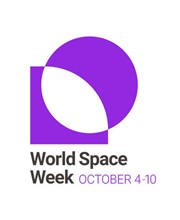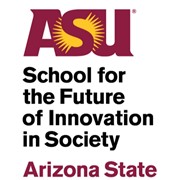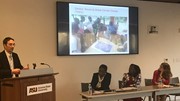How Should Space Technologies and Data Support Local Communities?
When: Monday, October 8, 2018
Time: 5:00 pm - 7:00 pm
Where: Arizona State University Barrett and O'Connor Washington Center 1800 Eye Street, NW, Washington, D.C. 20006
The satellite imaging market is expanding at an unprecedented rate, with thousands of satellite launches planned over the next decade. The market for Earth observation data and value-added services is projected to grow from $3B USD in 2016 to $15B USD by 2026 In addition, governments around the world continue to make available new sources of open Earth observation data. Arguably, the largest hurdle in achieving more widespread use of Earth observation data for wide-spread benefit is reaching new non-traditional customers in the public and private sector and in previously underserved markets.
In a recent report by FAO it was predicted that as agriculture adopts more labor saving technologies, men may branch out of agriculture to other sectors. This would leave women, especially those from low income countries, to bear even more of the labor in agriculture activities. Therefore, it is pertinent to understand how best to serve these women farmers, particularly in the face of changing climate, so that they put healthy food on the table and combat hunger and malnutrition.
The United Nations declared “World Space Week,” October 4-10, 2018, celebrated the role of space in bringing the world closer together. Unleashing the power of mobile technologies that puts more information into the hands of women farmers is one way that we can come closer together. Using Earth observation data more widely and effectively farmers can make climate-smart decision and make sure that food security exists even as the climate becomes harsher and erratic. But how can we maximize the benefits of space technology and data? What do decision makers and end users truly need in order to address a variety of global problems? How can we bring public and private investment to deploy new innovation in climate-smart agriculture? This event explored this issue by using one specific user group, African women farmers, as a discussion focus.
Co-hosted with the Centre for Innovation, Development and Society and the School for the Future of Innovation in Society, Arizona State University, this event is part of a nation-wide Ladies do Launch/Space for Women Panel series. Other events as part of the series took place in Seattle, New York and San Francisco/Oakland Bay Area.
Speakers
Opening Remarks: Ms. Krystal Wilson, Director of Space Applications Programs, Secure World Foundation
Panel: A Discussion on Earth Observation Data, Climate Change, and African Women Farmers
- Dr. Caroline Mwongera, Farming Systems and Climate Change Scientist, International Center for Tropical Agriculture (CIAT)
- Mr. Kevin Horn, USAID GeoCenter
- Dr. Nancy Searby, Earth Applied Sciences Capacity Building Program Manager, NASA
- Moderator: Dr. Timiebi Aganaba-Jeanty, Assistant Professor, Arizona State University School for the Future of Innovation in Society
Event Materials
For more information, contact Director of Space Applications Programs Krystal Wilson at kwilson@swfound.org.




 Share
Share